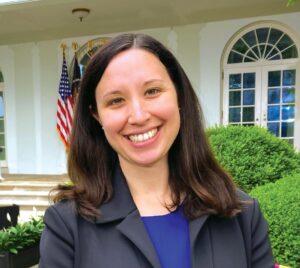
Hila Levy MS ’14 was 11 years old when she told her parents she wanted to join the Air Force. They thought she would eventually change her mind, she confides. But in 2008, her determination earned her Top Graduate honors (she was No. 1 out of 1,026) from the U.S. Air Force Academy.
“The idea of service has always motivated me, and lifelong learning and curiosity are what drive me,” says Levy, a major in the U.S. Air Force Reserve who is a native of Puerto Rico and the daughter and granddaughter of both Israeli and U.S. military service veterans.
Five academic degrees later (including a master’s degree—her third—in environmental planning and management from the Whiting School’s Engineering for Professionals program), this heady trifecta of ambitions coupled with an openness to embrace change, has led Levy to every continent and around the globe before her current stop in Washington, where she recently completed a one-year appointment as a White House Fellow in the Office of Science and Technology Policy.
The highly competitive, leadership-oriented fellowship is designed to give early to mid-career nongovernment or military professionals from an array of backgrounds the opportunity to observe and participate in the highest level of government. Maybe not the most obvious choice for an Oxford University graduate with a DPhil in zoology who wrote her dissertation on Antarctic penguins, but Levy has always been eager to build on her varied experiences and take a step toward a long-term goal of working in high-level federal public service.
“The idea of service has always motivated me, and lifelong learning and curiosity are what drive me.”
— Hila Levy
As a Fellow, and now in her continued role at the Office of Science and Technology Policy, Levy has used her expertise to call attention to current challenges the polar regions face—including impact from overfishing, climate change, pollution, and threats of resource exploitation—and has made it a priority to make sure the Antarctic is represented in national policy.
“Our office works a lot on catastrophic risks, and on any given day, we’re thinking about how we can protect the planet,” explains Levy.
“Antarctica is such a meaningful place for me. The region as a whole makes up about 10% of the world in surface area,” Levy says. “What happens there affects all of us, particularly with the risk of ice sheet melt and sea level rise.”




